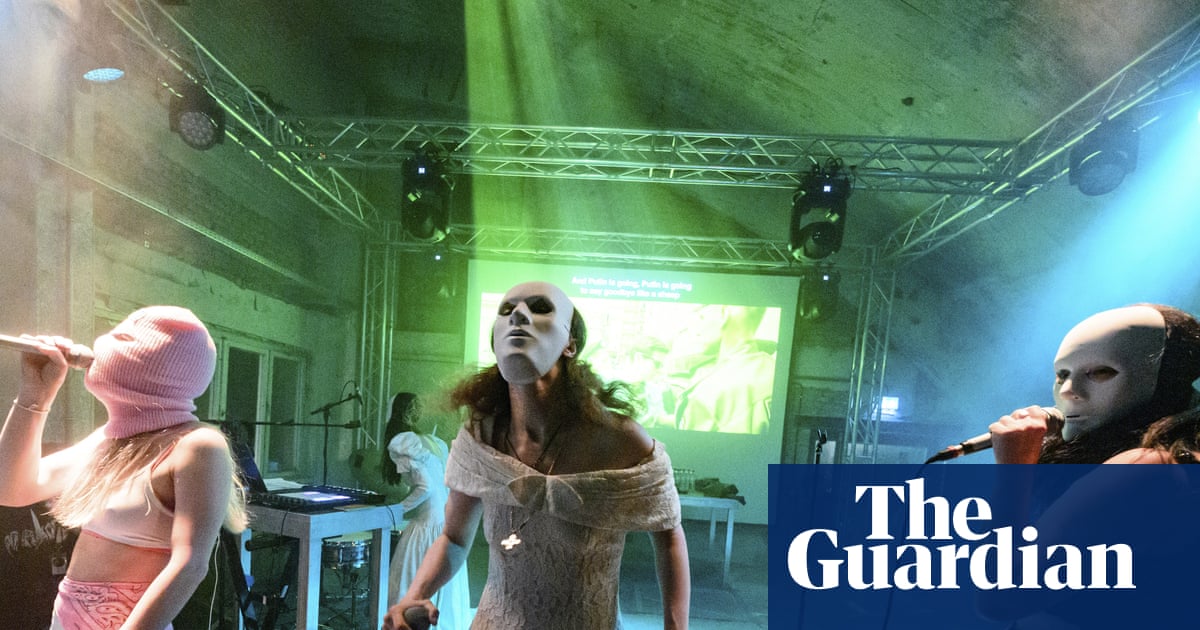Director Jamie Lloyd has outraged some theatregoers, who evidently feel short-changed after paying good money to see Rachel Zegler as Eva Perón. In one scene, she wanders off stage and on to an outward-facing balcony to sing a magnetic reprise of Don’t Cry for Me Argentina to the gathered crowd outside the theatre.
What are these grumps complaining about? Not long ago, Lloyd staged Romeo and Juliet in the West End, but here is a balcony scene like no other. It makes for a sensational moment, when Perón triumphantly addresses the crowd on her husband Juan’s election victory. It is 360-degree theatre, for the rich inside (who see it on a video feed) and for the “hoi polloi” outside – very fitting for Perón given her disdain for the wealthy.
It is no less than the director’s biggest coup de theatre: the public itself is enlisted for his mise en scene of populist rallies, crowd hypnotism and authoritarian charm. The crowd might represent late 1940s Buenos Aires – or mid 2020s America under the spell of becoming “great again”. Never mind complaints of a free show – maybe Lloyd should be paying them.
Lloyd previously staged this Andrew Lloyd Webber musical (with lyrics by Tim Rice) at Regent’s Park Open Air theatre in 2019. Then, it seemed like a dark high school musical, with stairs like bleachers and actors resembling flinty-eyed teens. This iteration has a streak of that but is bolder, more polished and pumped up.

Zegler, in her West End debut, is phenomenal. Stripped to undergarments, she is an indifferently exposed Perón, conniving, deliciously villainous, pocket-sized yet steely in the extreme: a consummate ice queen. She strides with hands on hips, louche in her unstoppable ambition.
There is comedy in her relationship with singer Agustín Magaldi (Aaron Lee Lambert, who sings On This Night of a Thousand Stars in a brilliant, barrel-like baritone), whom she swiftly, slickly disposes of once she has met Juan Perón (James Olivas). The new couple are well suited, their chemistry apparent in the duet I’d Be Surprisingly Good for You.
If a successful musical is simply about the singing, dancing and spectacle, this one soars. The choreography by Fabian Aloise, who has previously worked on three other Lloyd shows, is out-of-this-world imaginative. The ensemble mesmerise with their sexual energy and charismatic aggression. A sinister military figure body-pops and balloons burst every time a gun is fired and detractors are popped off, one by one.
These moves, this mood and this conspicuous melodrama would not look out of place in a Lady Gaga or Beyoncé stadium show. Nor would Jon Clark’s lighting design and Adam Fisher’s sound design: they are thunderous and pulsating.

It’s hypnotic but the narrative takes a backseat for this rock musical, which is almost entirely sung through, with what feels like thin connective tissue in its story. You see Perónism slipping into authoritarianism but don’t quite understand how. In Lloyd’s previous staging, the character of Che (Diego Andres Rodriguez, also the singing narrator) wore a Che Guevara T-shirt to let the audience know who he was. Now he is in black, and for those who are new to this story he might remain anonymous.
There is an approximation to the characters as a whole, with very little focus on Perón’s interiority. Maybe that is not the point, but how then can the audience feel the tragedy of her untimely death – which takes up so much time in the second half of the musical – if they cannot connect with it emotionally?
The tone changes after the balcony scene, moving from blingy and bombastic to a quieter, more mournful register. For the first time you glimpse Perón’s private emotion, after her great public display, as she sits in her dressing room in tears. It is an illuminating moment but this glimmer is not carried through into something more affecting. So the end bears a vacancy once the spectacle has abated – as if the real show finished some time ago. Don’t Cry for Me Argentina, she sings, and you find yourself dry-eyed, although Zegler is a vocal powerhouse, as are the other performers.
If you feel denied of the subtleties of story, character and commentary on populist power, you will still have an eye-popping night out. And the balcony scene is a stroke of genius.
-
At London Palladium until 6 September

.png) 2 months ago
36
2 months ago
36

















































